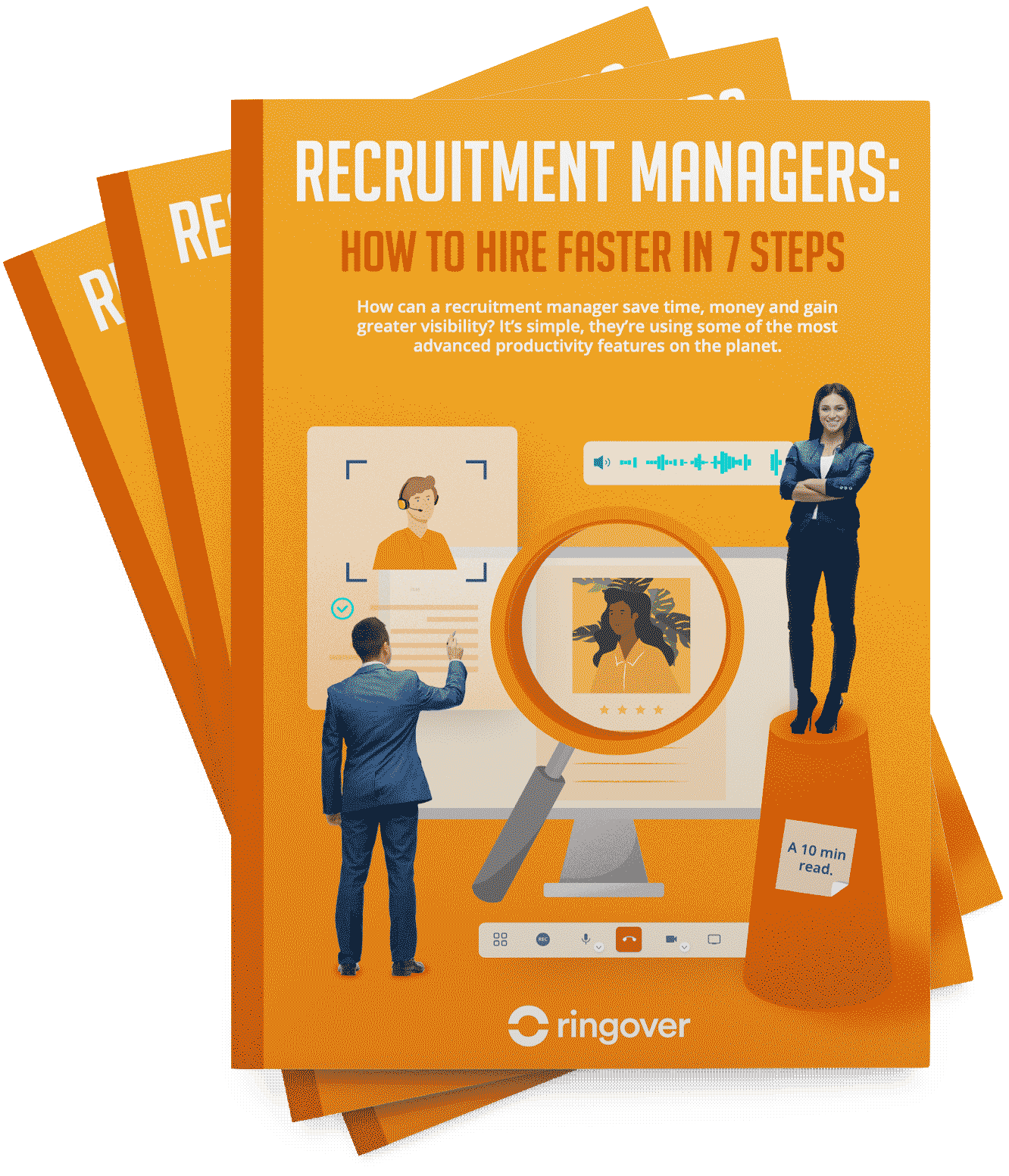Summary
This guide covers all the essentials to launching a successful staffing agency in Texas, from drafting a detailed business plan and securing funding, to obtaining necessary licenses and cultivating strong relationships with both clients and candidates.
Discover Ringover for Staffing10 Steps to Starting a Staffing Agency in Texas
Step 1: Develop a Business Plan
A well-crafted business plan is essential for the success of any venture. It should detail your objectives, target market, services provided, and financial forecasts.
This document will act as a roadmap for your business, assisting you in overcoming potential obstacles and maintaining focus on your goals.
Step 2: Secure Funding
Launching a staffing agency demands a substantial upfront investment. Startup costs can vary widely, from $16,000 to more than $1 million, based on the scale of your operation. It's vital to ensure you have sufficient working capital to cover initial outlays such as office setup, software purchases, and payroll.
Step 3: Define Your Niche
Carving out a specific niche is key to distinguishing your agency in the competitive staffing sector. Reflect on your expertise, market demand, and how you can offer unique value compared to competitors.
For instance, you may focus on providing staffing solutions in healthcare, technology recruitment, or the hospitality industry.
Step 4: Register Your Business
Registering your staffing agency with the Texas Secretary of State is a necessary step, choosing a legal structure like an LLC or corporation. Ensure your chosen business name is unique and conduct a name search. Additionally, you'll need to secure a tax ID number and any required licenses and permits, the first legal building blocks in understanding how to start a staffing agency in Texas.
Step 5: Obtain Necessary Licenses and Permits
In Texas, staffing agencies are required to be licensed through the Texas Workforce Commission (TWC). This process involves obtaining a sales tax permit, workers' compensation insurance, liability insurance, and a surety bond, ensuring your agency adheres to state ethical and professional standards.
Step 6: Set Up Your Business Location
Selecting a strategic location is vital for accessibility to clients and job seekers alike. Take into account factors like accessibility, local demographics, and growth potential.
Considering a remote or shared workspace can also help minimize initial expenses.
Step 7: Get the Right Business Software
The right business software is indispensable for the smooth operation of your staffing agency. For example, Ringover, a cloud-based omnichannel contact center solution, can significantly enhance your operations with features like call tracking, CRM integrations with popular options like Salesforce and Hubspot, ATS integrations like Bullhorn and Vincere, and automated power dialers, to name just a few.
When you're getting in touch with clients and candidates, you'll even have a videoconference option to connect face-to-face from a distance. Overall, these powerful business phone system and omnichannel communication tools streamline recruitment, improving client and candidate communication, and increasing productivity.
Step 8: Secure Insurance and Workers' Compensation
Securing the appropriate insurance coverage, including workers' compensation and general liability insurance, is essential. Workers' compensation covers employees in the event of work-related injuries or illnesses, while liability insurance protects your business from legal actions and claims.
Step 9: Establish a Marketing Strategy
Crafting a strong marketing strategy is essential for attracting both clients and job seekers. This involves building a solid online presence through your website and social media channels, engaging in local advertising efforts, and fostering relationships with industry stakeholders. Effective marketing enables you to differentiate yourself in a crowded market and attract the necessary talent and clientele.
Step 10: Launch and Grow Your Business
With all preparatory measures in place, it's time to launch your staffing agency. Set a detailed timeline for your launch, with realistic deadlines for each task, ensuring compliance with all state regulations.
Continuously review and refine your strategies to adapt to the changing dynamics of the Texas staffing industry, driving growth and success for your business.
Does a Staffing Agency Need a License in Texas?
In Texas, staffing agencies are subject to strict licensing requirements to ensure they comply with state regulations. If you're looking into how to start a staffing agency in Texas, here's a detailed guide on the licensing you'll need:
Licensing Requirements
To legally operate a staffing agency in Texas, obtaining a license from the Texas Workforce Commission (TWC) is essential. In certain situations, the Texas Department of Licensing and Regulation (TDLR) may also be involved. The TWC oversees staffing agencies to guarantee adherence to the state's ethical and professional standards, an important consideration for those wondering how to start a staffing agency in Texas.
Types of Licenses
The specific license required depends on the services your agency offers. While a TWC license suffices for most general staffing agencies, those in healthcare or other specialized sectors might need additional licenses or certifications from the Texas Department of Health and Human Services (DHHS).
Application Process
Securing a license involves multiple steps, including registering your business with the Texas Secretary of State, obtaining a sales tax permit if needed, securing workers' compensation and liability insurance, and acquiring a surety bond to protect against claims for unpaid wages or other employment-related issues.
Compliance and Renewal
After obtaining the necessary licenses, it's critical to stay compliant with state regulations. This involves periodically renewing your licenses and meeting all ongoing compliance requirements. Non-compliance can lead to license revocation and other legal penalties.
Additional Requirements
Beyond TWC or TDLR licenses, local business licenses or permits may be required depending on your location in Texas. It's important to consult local authorities to ensure you have all necessary permits for lawful operation. Adhering to these licensing requirements helps your staffing agency operate legally and maintain a reputable standing in the Texas staffing industry.
Is It Profitable to Start a Staffing Agency in Texas?
Starting a staffing agency in Texas can be a highly profitable venture, given the state's robust economy and the continuous demand for skilled workers. Here are some key factors that highlight the profitability of this business model:
Revenue Potential
The staffing industry in the United States generates over $160 billion in revenue annually, and Texas, with its diverse and thriving economy, contributes significantly to this figure. Staffing agencies make money by deducting a percentage of the salary set by employers, which can range from 30% to 70% depending on the supply, demand, location, and type of business.
Profit Margins
The average profit margin for a staffing agency is about 15% to 20%. This margin is influenced by factors such as client retention, operational efficiency, and the pay rates of temporary employees compared to the rates charged to clients. Effective management and strategic planning can help maximize these margins.
Growth Opportunities
Texas's economy, driven by sectors such as energy, healthcare, technology, and hospitality, continuously generates a strong need for talented professionals. This demand, combined with the state's low unemployment rate, makes staffing agencies essential for linking businesses with qualified job candidates.
As the economy grows, so does the potential for staffing agencies to expand their services and increase their revenue.
Cost Management
While the initial startup costs for a staffing agency can range from $16,000 to over $1 million, depending on the size and scope of the business, managing these costs effectively is important for profitability. This includes optimizing office expenses, leveraging technology, and ensuring efficient payroll funding for temporary workers. For instance, investing in a staffing franchise can provide comprehensive support and reduce some of the initial and ongoing costs.
Client and Candidate Satisfaction
A key factor in the profitability of a staffing agency is the ability to maintain strong relationships with both clients and candidates. By providing excellent service, ensuring high-quality placements, and offering competitive benefits, staffing agencies can build a loyal client base and attract top talent.
This not only enhances revenue but also fosters long-term growth and success.
Market Differentiation
Differentiating your staffing agency through specialized services or niche markets can significantly enhance profitability. Focusing on high-demand industries such as IT, healthcare, or construction can position your agency as a go-to resource, attracting higher-paying clients and top candidates.
This specialization can also improve your agency's online visibility and SEO, further increasing your market reach.
In summary, starting a staffing agency in Texas can be highly profitable if managed correctly. By understanding the revenue potential, managing costs efficiently, and differentiating your services, you can build a successful and lucrative business that meets the growing demands of the Texas job market.
A VoIP software provides more than just unlimited calls, but also multichannel communications and integrations with staffing business software. You’ll be able to meet customers where they are and improve your productivity thanks to Ringover!
What are the Risks of Having a Staffing Agency in Texas
Economic Downturns
Economic fluctuations can significantly impact the viability of a staffing agency. During economic downturns, businesses often reduce their workforce, leading to a decrease in demand for temporary or contract workers. This can result in reduced job orders and revenue for the agency, making it challenging to sustain operations.
Legal Compliance and Regulatory Risks
Staffing agencies in Texas must navigate a complex web of labor laws and regulations. Non-compliance with employment laws, such as minimum wage, overtime, or workplace safety regulations, can lead to costly lawsuits and fines. Ensuring compliance with state and federal regulations is essential to avoid these risks.
Client Dependence
Over-reliance on a small number of clients can expose your staffing agency to significant financial risks. If a major client reduces its business with your agency or switches to a competitor, it could severely impact your revenue. Diversifying your client base is essential to mitigate this risk.
Worker Classification Risks
Determining whether a worker is an employee or an independent contractor is critical but often challenging. Misclassifying workers can lead to legal troubles and financial penalties. Clear definitions of employment relationships and seeking legal guidance can help avoid these issues.
Competitive Market Risks
The staffing industry in Texas is highly competitive, with many agencies vying for the same clients and talent pool. Differentiating your agency through specialized services, exceptional customer service, or unique recruitment strategies is vital to stay ahead of the competition.
Cash Flow Management Risks
Staffing agencies often face cash flow challenges due to the nature of their business. Paying workers on time while waiting for client payments can create cash flow gaps. Implementing strict financial management practices, such as effective invoicing and credit policies, and maintaining cash reserves or a line of credit can help mitigate these risks.
Workers' Compensation and Workplace Safety Risks
Workers' compensation claims can pose a significant risk to staffing agencies. Ensuring that both the agency and the host employer comply with OSHA requirements and provide a safe working environment is essential. Ignoring these responsibilities can lead to serious injuries, fatalities, and substantial fines.
Contract and Agreement Risks
Contracts and agreements between staffing agencies, clients, and candidates must be carefully managed to avoid disputes and legal issues. Clear contractual terms, obligations, and expectations can protect the interests of all parties involved and prevent misunderstandings that could lead to costly litigation.
Intellectual Property and Data Security Risks
With the increasing use of contingent workers, there is a growing risk related to intellectual property and data security. Ensuring that temporary workers do not compromise sensitive information and maintaining robust cybersecurity measures are critical to protecting both the agency's and the clients' interests.
What to Remember
In conclusion, starting a staffing agency in Texas offers both a lucrative opportunity and a set of challenges.Just make sure you follow the step-by-step guide outlined above to give yourself the best chance for success! And don't forget to choose wisely when it comes to selecting your business software. If you want to see what a VoIP phone like Ringover can do to transform your operations, start your free trial today!




